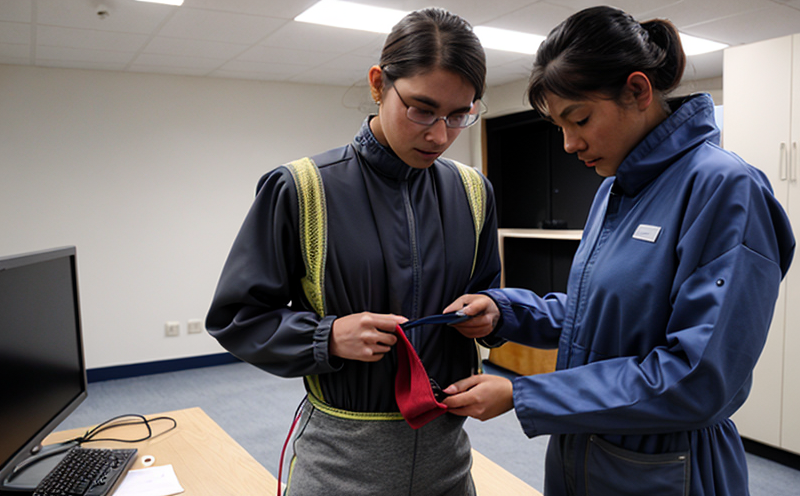ASTM D3786 Bursting strength of nonwoven geotextiles
The ASTM D3786 standard is a crucial tool in the characterization and quality assurance of nonwoven geotextiles. This test measures the bursting strength, which represents the maximum internal pressure that a geotextile can withstand before it bursts or fails. Bursting strength testing is essential for ensuring the durability and integrity of these materials used in civil engineering projects.
In the context of quality management within textile production, ASTM D3786 serves as a benchmark to ensure consistency in material performance across batches. For compliance officers, this test provides a clear standard against which to evaluate the compliance with regulatory requirements. R&D engineers can use it to refine the design and composition of nonwoven geotextiles. Additionally, procurement teams benefit from this test by ensuring that suppliers meet specified quality standards.
The testing procedure involves preparing a specimen cut according to ASTM D3786 specifications. The sample is clamped into an apparatus designed to apply pressure uniformly until failure occurs. The bursting strength is then measured in pounds per square inch (psi). This data is critical for civil engineers who rely on nonwoven geotextiles to provide stability and support in various applications, such as roadways, embankments, and landfills.
The significance of this test extends beyond mere quality assurance. It plays a vital role in ensuring that the materials used meet the stringent requirements set by international standards for environmental sustainability and safety. By adhering to ASTM D3786, manufacturers can contribute to reducing waste and promoting sustainable practices in construction projects.
Understanding the real-world applications of this test is crucial for stakeholders in the textile industry. For instance, highway departments use nonwoven geotextiles to prevent soil erosion and enhance the performance of drainage systems. In landfill operations, these materials help manage leachate and stabilize waste. The bursting strength test ensures that these critical functions are reliable under varying environmental conditions.
The ASTM D3786 standard is widely accepted across industries due to its robust methodology and clear guidelines. This reliability makes it a preferred choice for civil engineers, architects, and other professionals involved in infrastructure development. By implementing this test, organizations can ensure that their projects meet the highest standards of safety and performance.
The procedure outlined in ASTM D3786 is straightforward yet precise. Specimens are cut to specific dimensions, ensuring consistency across tests. The apparatus used for testing must be capable of applying uniform pressure, which requires careful calibration. Once the specimen bursts, the maximum applied pressure is recorded as the bursting strength.
The importance of this test cannot be overstated in the context of environmental and sustainability contributions. By ensuring that nonwoven geotextiles meet rigorous standards for bursting strength, manufacturers can contribute to a more sustainable built environment. This reduces the risk of premature failure, which would necessitate additional material usage and increased environmental impact.
In conclusion, ASTM D3786 is an indispensable tool in the textile industry, particularly for quality management, compliance, R&D, and procurement teams involved with nonwoven geotextiles. Its role in ensuring consistent performance and reliability makes it a cornerstone of civil engineering projects worldwide.
Applied Standards
| Standard Number | Description |
|---|---|
| ASTM D3786-19 | This standard specifies the procedure for determining the bursting strength of nonwoven geotextiles. It includes details on specimen preparation, testing apparatus, and procedures. |
| EN ISO 20645:2017 | An equivalent European standard that provides a harmonized approach to the measurement of tensile properties of nonwoven geotextiles. This can be cross-referenced for additional validation. |
| ISO 13934-1:2006 | This international standard covers the determination of tensile strength and elongation at break of nonwoven fabrics, which is complementary to ASTM D3786 when evaluating mechanical properties. |
International Acceptance and Recognition
- Bursting strength testing according to ASTM D3786 is widely recognized in North America, particularly in the United States and Canada.
- The standard enjoys international recognition in Europe, as evidenced by the adoption of EN ISO 20645.
- ISO 13934-1:2006, while not directly related to bursting strength, is internationally accepted for tensile property testing and can complement ASTM D3786.
Environmental and Sustainability Contributions
The use of ASTM D3786 in the characterization of nonwoven geotextiles contributes significantly to environmental sustainability. By ensuring that these materials meet stringent performance criteria, manufacturers can minimize waste and reduce the need for frequent replacements. This leads to longer service life and reduced carbon footprint associated with construction projects.
The bursting strength test is particularly important in civil engineering where nonwoven geotextiles are used to prevent soil erosion, stabilize slopes, and manage leachate in landfills. These applications directly contribute to environmental protection by enhancing the durability of infrastructure and reducing the impact on natural ecosystems.
Moreover, the consistent performance ensured by ASTM D3786 helps civil engineers make informed decisions about material selection. This leads to more effective use of resources and reduced environmental impact. The test also supports sustainability initiatives by providing data that can be used in life cycle assessments (LCAs) for construction projects.
By adhering to standards like ASTM D3786, manufacturers and contractors can contribute to a more sustainable built environment. This not only benefits the immediate project but also has broader implications for environmental protection and resource conservation.





